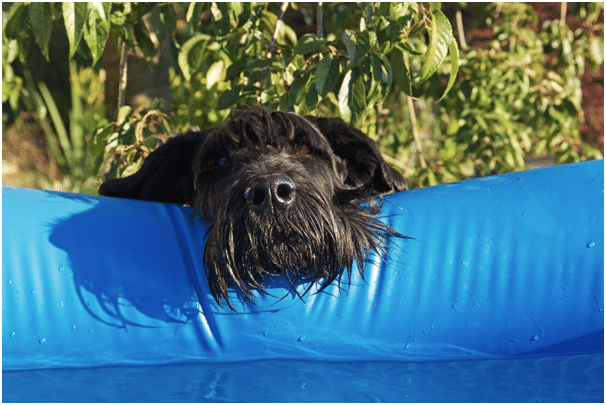As Giant Schnauzers are protective family dogs with a stable temperament, you may be wondering if they are good service dogs.
Giant Schnauzers make good service dogs as they are loyal and protective of their family and friends. They are also intelligent and easy to train. However, they do require a lot of exercise and can be prone to barking and chewing. If these needs are met, a Giant Schnauzer can make a great service dog.
We look into the different types of service dogs along with other important facts you should know if you wish to own one.
Can Giant Schnauzers be Good Service Dogs?
As Giant Schnauzers are a very versatile breed, they can be service dogs, therapy dogs, working dogs, and even family pets. However, they do have some specific needs that must be met in order for them to thrive in any of these roles.
Do Schnauzers Make Good Therapy Dogs?
Schnauzers can make great therapy dogs. They are known for their loyalty, intelligence, and easy trainability.
Schnauzers are particularly good therapy dogs because they come in both miniature and standard sizes. This means that there is a Schnauzer to fit every need.
Miniature Schnauzers are great for visits to hospitals and nursing homes, while standard Schnauzers can be used in schools and other settings.
No matter what size, all Schnauzers have the potential to be great therapy dogs. It just depends on if their needs are met. Therapy includes physical, occupational, and speech.
Some common things people want to know about therapy dogs are: how they are trained, what types of tasks they perform, where they work, and what benefits they provide.
Therapy dogs are usually trained by their owners or by a professional trainer. They learn basic obedience commands as well as specific tasks that they will be required to perform in their job. Common tasks include: sitting, staying, lying down, coming when called, and walking on a leash.
Therapy dogs work in a variety of settings such as: hospitals, nursing homes, schools, libraries, and disaster areas. They provide comfort and companionship to people who are sick, lonely, stressed, or grieving.
There are many benefits of having a therapy dog. Studies have shown that interacting with a therapy dog can lower blood pressure and anxiety levels, improve moods, and increase socialization skills. Therapy dogs also provide non-judgmental support and unconditional love.
What are the Different Types of Service Dogs?
Service dogs can be classified into three main categories: guide dogs, hearing dogs, and service dogs for people with other disabilities.
- Guide dogs are trained to help people who are blind or have low vision. They learn to follow the commands of their handlers and avoid obstacles in their path.
- Hearing dogs are trained to assist people who are deaf or hard of hearing. They learn to respond to various sounds and signals, such as doorbells or alarms.
- Service dogs for people with other disabilities may be trained to perform a variety of tasks, depending on the individual’s needs. Some common tasks include retrieving items, opening doors, and providing assistance in getting up from a fall.
How do I Know if My Dog would be a Good Service Dog?
Not all dogs are suited for service dog work. Dogs that are good candidates for service dog training typically have a good temperament, are easy to train, and are comfortable working in public settings.
If you think your dog might be a good candidate for service dog work, it’s best to consult with a professional trainer or organization that specializes in service dog training.
Can any Breed of Dog be a Good Service Dog?

Yes, any breed of dog can be a good service dog. However, some breeds are more commonly used as service dogs than others.
Breeds that are often used as service dogs include Labrador Retrievers, Golden Retrievers, German Shepherds, and Standard Poodles. Giant Schnauzers, Australian Cattle Dogs, and Border Collies are also commonly used as service dogs.
Do all Service Dogs have to be Professionally Trained?
No, many service dogs are trained by their owners. However, it is important to receive professional training if you plan to use your dog in a public setting.
Training a service dog is a complex process that involves teaching the dog how to behave in a variety of situations and obey specific commands. Professional trainers have the expertise and experience necessary to provide your dog with the best possible training.
Keeping in mind, that teaching your dog new things can happen quickly and easily by utilizing some clever online training options.
The training listed below is what we highly recommend for quick results!

Are Service Dogs Allowed in all Public Places?

There is no universal rule that dictates whether service dogs are allowed in all public places. However, most businesses and organizations are willing to make reasonable accommodations for service dogs and their handlers.
If you are planning to take your service dog into a public setting, it is always best to call ahead and inquire about the policies regarding service animals.
What are the Responsibilities of a Service Dog Handler?
Service dog handlers have a few important responsibilities. They must maintain control of their dog at all times, ensure that their dog is well-behaved in public, and take care of their dog’s basic needs (e.g., feeding, watering, grooming).
They may also be responsible for training their dog and teaching it the specific tasks it has been trained to do.
How Much Does a Service Dog Cost?
The cost of a service dog can vary depending on the training and certification level of the dog. Generally speaking, professional-trained service dogs will cost more than those that are trained by their owners.
However, there are a number of organizations that offer financial assistance to people who need help in obtaining a service dog.
What are the Benefits of Having a Service Dog?
There are many benefits to having a service dog. Service dogs can provide independence and mobility for people with disabilities, help people in times of crisis, and provide companionship.
They can also offer a sense of security and safety for their handlers. In addition, service dogs can provide peace of mind for family and friends of people with disabilities by giving them the knowledge that their loved one has a loyal and reliable companion.
What are Some Common Misconceptions about Service Dogs?
One of the most common misconceptions about service dogs is that they are only used by people who are blind or have low vision.
While service dogs can certainly be used by people who are blind or have low vision, they can also be used by people with a variety of other disabilities.
Another common misconception about service dogs is that they are only used in public places. In reality, service dogs can be used in a variety of settings, including at home, at work, and in social situations.
How Can I Make my Dog a Good Service Dog?
There is no one-size-fits-all answer to this question, as the training and requirements for service dogs can vary depending on their intended purpose.
However, there are a few basic things you can do to help your dog become a good service dog.
First, make sure your dog has a strong foundation of obedience training. This will help your dog learn to follow commands and stay focused in a variety of situations.
Second, socialize your dog as much as possible. This will help your dog get used to being around different people and animals and will make it less likely to be startled or intimidated by new environments.
Finally, give your dog plenty of opportunities to practice the specific tasks it has been trained to do. This will help your dog become more confident and proficient in its skills.
Can a Shy Dog be a Service Dog?
Yes, a shy dog can be a service dog. However, it is important to note that not all shy dogs are suitable for service work. Dogs that are shy or fearful may not be able to handle the stress and noise of public places, which can make them difficult to take around town.
If you have a shy dog that you would like to train for service work, it is important to consult with a professional trainer or behaviorist to assess whether your dog is a good candidate for the job.
What are the Characteristics Required for a Good Service Dog?
The characteristics required for a good Service dog will vary depending on the specific job the dog is being trained to do. However, there are a few general qualities that are important for all Service dogs.
First, the dog must be intelligent and able to learn new tasks quickly.
Second, the dog must be physically strong and healthy, with no medical conditions that would prevent it from performing its duties.
Third, the dog must be calm and well-behaved and have a good temperament for working with people.
Finally, the dog must be comfortable in a variety of environments, including busy public places.
What is the Training and Certification for Therapy Dogs?
The training and certification for therapy dogs can vary depending on the organization you are working with.
However, most therapy dog organizations require that dogs complete a basic obedience course and pass a temperament test before they can be certified.
In addition, many organizations require that handlers complete a training course on how to work with therapy dogs. After your dog has been certified, you will likely need to renew its certification every one to two years.
What is the Difference Between a Service Dog and a Therapy Dog?
Service dogs are trained to perform specific tasks that help their owners with a disability. Therapy dogs are not trained to perform specific tasks, but instead, provide comfort and companionship to people in a variety of settings.
Can a Service Dog be Used to Help People with Anxiety?
Yes, a service dog can be used to help people with anxiety. In fact, many people with anxiety disorders find that having a service dog helps them feel more calm and secure.
Dogs that are specifically trained to help people with anxiety can provide deep pressure therapy, which can help to ease anxiety symptoms.
Service dogs can also be trained to perform specific tasks that can help their owners feel more in control of their environment, such as providing reminders to take medication or checking for exit routes in a building.
Can a Service Dog be Used to Help People with PTSD?
Yes, a service dog can be used to help people with PTSD. Dogs that are specifically trained to help people with PTSD can provide deep pressure therapy, which can help to ease symptoms of PTSD.
Service dogs can also be trained to perform specific tasks that can help their owners feel more in control of their environment, such as providing reminders to take medication or checking for exit routes in a building.
What are the Most Popular Service Dog Breeds?
The most popular Service Dog Breeds are Labrador Retrievers, Golden Retrievers, and German Shepherds.
However, any breed of dog can be trained to be a Service Dog, as long as it has the necessary intelligence, physical strength, and temperament.
What is the Cost of Owning a Service Dog?
The cost of owning a Service Dog can vary depending on the specific dog and its training. However, most Service Dogs cost between $10,000 and $30,000.
Some organizations may provide financial assistance to help offset the cost of owning a Service Dog.
How Long Does it Take to Train a Service Dog?
The length of time it takes to train a Service Dog can vary depending on the dog’s breed, intelligence, and training.
However, most Service Dogs require at least 18 months of training before they are ready to be placed with an owner.
How Much Work is Involved in Owning a Service Dog?
The amount of work involved in owning a Service Dog can vary depending on the specific dog and its training. However, most Service Dogs require daily exercise, regular grooming, and basic obedience training.
In addition, Service Dogs must be well-behaved in public and should not exhibit any aggressive behaviors. Giant Schnauzers can make good service dogs, on the condition they are trained from an early age and socialized appropriately.


